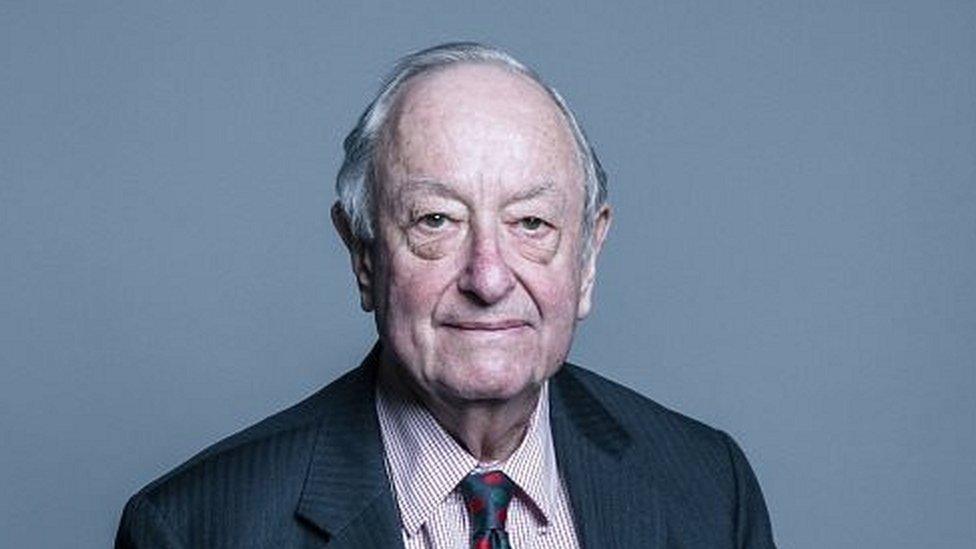Campaigner feels 're-victimised' after peer's groping ban blocked
- Published
Jasvinder Sanghera tells Today she felt 're-victimised'
A women's rights campaigner has said she feels "re-victimised" after a peer she has accused of sexual harassment was told he would not face immediate suspension from the House of Lords.
Jasvinder Sanghera said she felt "bullied from afar yet again" after peers voted for the case against Lord Lester to be looked at again.
She said it was "disheartening" how peers had focused more on procedural issues rather than her allegations.
Lord Lester says her claims are untrue.
The former Lib Dem peer faced being suspended from the Lords until 2022, the longest ban in parliamentary history, after Ms Sanghera accused him of groping her and offering her a peerage in return for sleeping with him.
The Privileges and Conduct Committee, external, which oversees members' behaviour, said earlier this week that the 82-year-old peer had "failed to act on his personal honour by sexually harassing the complainant and offering her corrupt inducements to sleep with him".
But when the issue was debated in the Lords on Thursday, peers voted by by 101 to 78 to send the case back to the committee to look at it again in the interest of "natural justice and fairness".
Ms Sanghera said the allegations, which date back to 2006, had been upheld three times in the House of Lords and to now be told, in effect, that she was not "believed" realised her "worst fears".
She said peers seemed to be more concerned about Lord Lester's reputation than hers, while those who had spoken out on her behalf had been "sidelined".

Lord Lester has suggested due process has not been followed during the investigation
"Sitting there watching the debate for me personally felt as if I was being subjected to being bullied from afar yet again," she told BBC Radio 4's Today programme.
"I felt re-victimised. It was disheartening to hear members of the House of Lords straining to discuss me as an individual, what I did, what I didn't do. And nobody in that room, actually very few talked about the real issues here, the issues of sexual harassment and bullying."
Ms Sanghera, a campaigner against forced marriage, was not named in the Lords report but waived her anonymity, in an interview with the Times, to encourage other women to speak out about harassment.
She told the BBC's Victoria Derbyshire show that the peers' actions had sent completely the "wrong message" to victims of sexual harassment and bullying.
She said she would still encourage victims to speak out, but added that she "cannot advise any person at the moment out there who is a victim of sexual harassment at the hands of a peer to give them confidence to come forward because I would not want them to go through what I went through".
She said the Lords Commissioner for Standards, who carried out the original investigation, had followed the procedures laid down for her by peers and Lord Lester had not objected at any point during the probe.
But Lord Lester, a veteran human rights lawyer who worked for several decades on gender equality and race relations, has welcomed the Lords' decision.
He thanked peers who supported the amendment tabled by cross-bench peer Lord Pannick for "recognising the importance of process and now look forward to restoring my reputation".
Lord Pannick argued that the investigation process was "manifestly unfair" and that Lord Lester should have had the opportunity to cross-question his accuser if, as he claimed, the commissioner was unwilling to do so.
But the decision to refer it back to the committee was criticised by deputy Lords Speaker, the former Labour MP Lord McFall, who said it was "deeply disappointing".
- Published12 November 2018
